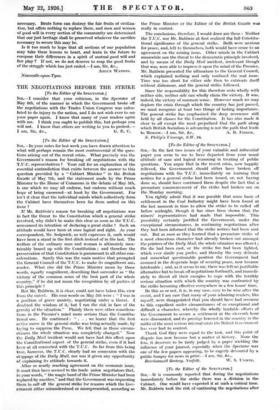[To the Editor of the SPECTATOR.] Sin,—In your notes for
last week you have drawn attention to what will perhaps remain the most controversial of the ques- tions arising out of the recent crisis. What precisely was the Government's reason for breaking off negotiations with the T.U.C. representatives ? Your call for an explanation of the essential contradiction that exists between the answer to this question provided by a " Cabinet Minister " in the British Gazette of May 7th, and the statement made by the Prime Minister to the House of Commons in the debate of May 5th, is one which we may all endorse, but endorse without much hope of being answered—at least by the Government. For isn't it clear that the individual minds which collectively form the Cabinet have themselves been far from united on this issue ?
If Mr. Baldwin's reason for breaking off negotiations was in fact the threat to the Constitution which a general strike involved, why didn't he make this clear as soon as the T.U.C. announced its intention of declaring a great strike ? Such an attitude would have been at once logical and right. As your correspondent, Mr. Sedgwick, so well expresses it, such would have been a stand in the first ditch instead of in the last; The welfare of the ordinary man and woman is ultimately inex- tricably bound up with the Constitution ; and therefore the preservation of that Constitution is paramount to all other con- siderations.. Surely this was the main motive that prompted the General Council of the T.U.C. to make its magnificent sur- render. What else did the Prime Minister mean by those words, equally magnificent, describing that surrender as " the victory of the common sense of the best part of- the whole country," if he did not mean the recognition by all parties of this principle, ?
But Mr. Baldwin, it is clear, could not have taken this view from the outset. His own words on May 5th were : " I was in a position . of grave anxiety, negotiating under a threat. I doubted the wisdom of it,. but I ran the risk in face of the gravity of the situation." Plainly there were other considera- tions in the Premier's mind more serious than the Constitu- tional one. lie continued : " . . . we learnt that the first active move in the general strike was being actually made, by trying to suppress the Press. We felt that in those circum- stances the whole situation was completely changed." Now the Daily Mail incident would not have had this effect upon the Constitutional aspect of the general strike, even if it had been at all connected with the T.U.C. So far from this being true, however, the T.U.C. clearly had no connexion with the stoppage of the Daily Mail, nor was it given any opportunity of explaining its attitude towards it.
After so nearly reaching agreement on the economic issue, it must then have seemed to the trade union negotiators that, in your words, " the magic hand of the Prime Minister had been replaced by another," and that the Government was requesting them to call off the general strike for reasons which the Gov- ernment either misunderstood or misrepresented, according as
the Prime Minister or the Editor of the British Gazette was really in control.
The conclusions, therefore, I would draw are these : Neither the T.U.C. nor Mr. Baldwin at first realized the full Constitu- tional significance of the general strike. Both were anxious for peace, and, left to themselves, both would have come to an agreement on the mining issue.. Other mind.s in the Cabinet meanwhile saw the threat to the democratic principle involved, and by means of the Daily Mail incident, irrelevant though that was, were able to impress it upon the mind of the Premier. Mr. Baldwin presented the ultimatum to the General Council, which explained nothing and only confused the real issue. Time was too short for either side then to extricate itself without dishonour, and the general strike followed.
Since the responsibility for this therefore rests wholly with neither side, neither side can wholly claim the victory. It was. indeed, the victory of common sense. However much we may deplore the crisis through which the country has just passed, we must recognize at least two things of lasting importance. The general strike has emphasized the deep reverence still held by all classes for the Constitution. It has also made it clear to all except the most prejudiced that the path along which British Socialism is advancing is not the path that leads to Moscow.—I am, Sir, &c., A. B. FISHER. S. Philip's Vicarage, S.W. 16.














































 Previous page
Previous page